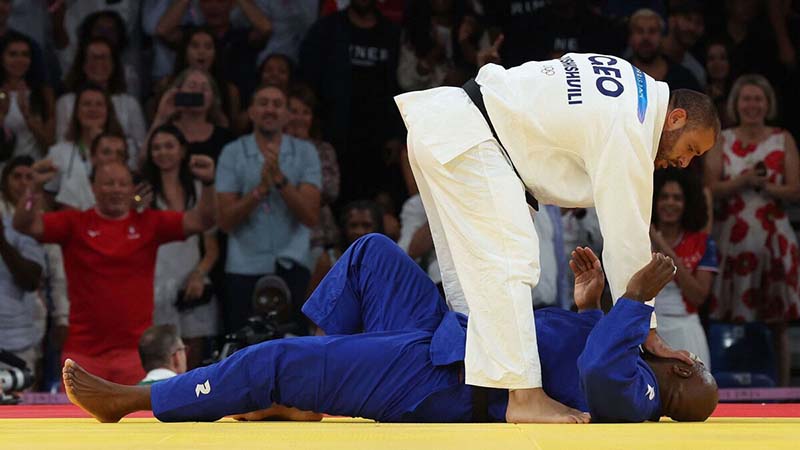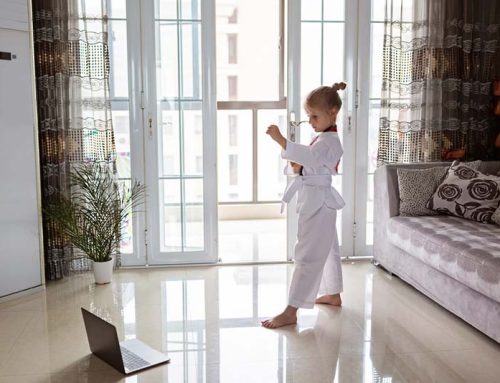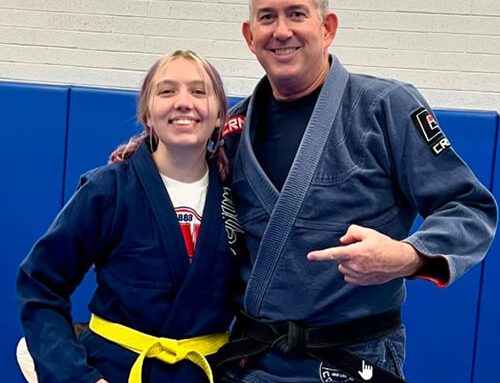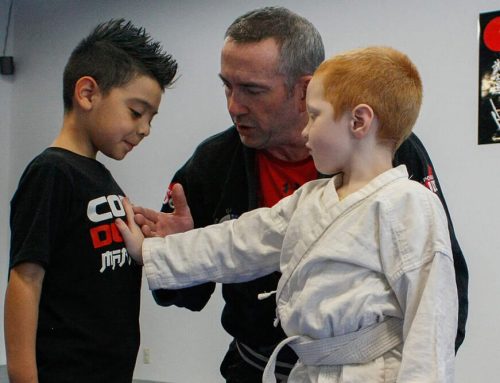The 2024 Olympic Games are winding down in Paris and so is the press and fanfare. One of the few times Judo is ever featured in the mainstream news media in the U.S. is during the Olympic Games, so we may not see Judo in the news again until the Olympics returns in 2028 to Los Angeles.
I always look forward to the Olympic years as an opportunity to promote Judo to a wider audience and ask my students if they watch and follow Judo during the Olympics. Inevitably, sports fans must hunt for the Judo matches as they are not usually primetime viewing. And, unfortunately, the Judo matches that get the most press and attention are those rare ones where something unusual or untoward happens.
For instance, in this last Olympics, the match my students most often commented on was the one between Georgian, Guram Tushishvili and French Judoka, Teddy Riner. The 100 kg match was marked by an unfortunate incident in which the Georgian competitor was disqualified after unsportsmanlike behavior towards the Frenchman who was favored to win. Tushishvili seemed to react to Riner’s winning move and drove his foot into Riner’s groin, then got up and pushed the winners head into the ground. Tushishvili was quickly disqualified, preventing him from competing for the bronze medal, and was given a 6-month suspension from ALL Judo sporting competitions.
Episodes like these are rare, but they make my argument that Judo improves one’s character harder swallow. I’ve several times had to reflect and ask myself, is the Olympics really that good for Judo?
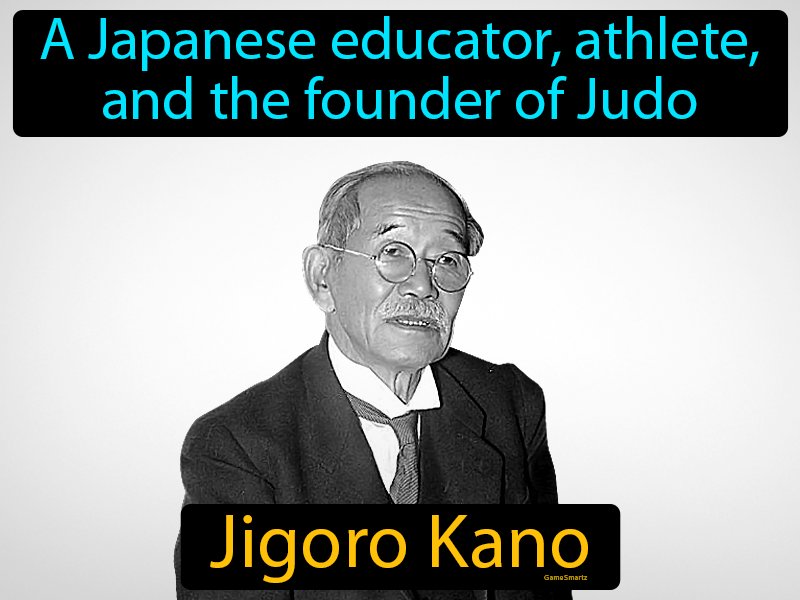
Suggesting we separate Judo from the Olympics may be viewed by many as sacrilege. They do have an intersecting history. Jigoro Kano was truly a person of international influence. In 1882, Kano founded Kodokan Judo, the world’s first Modern Martial Art. And in 1909, Kano helped found the Japanese Amateur Athletic Association and was appointed Japan’s first representative to the International Olympic Committee (IOC). Kano attended the early Olympic games in Amsterdam in 1928, Los Angeles in 1932, and then in Berlin in 1936 (all before Judo was an event).
To say Kano intended that Judo have a symbiotic relationship with the Olympics is a stretch that I don’t believe is likely. I am given to understand that Kano was rather ambivalent about Judo becoming an Olympic event. One source quotes Kano as saying:
“I have been asked by people of various sections as to the wisdom and possibility of Judo being introduced with other games and sports at the Olympic Games. My view on the matter, at present, is rather passive. If it be the desire of other member countries, I have no objection. But I do not feel inclined to take any initiative. For one thing, Judo in reality is not a mere sport or game. I regard it as a principle of life, art and science. In fact, it is a means for personal cultural attainment. Only one of the forms of Judo training, so-called Randori or free practice can be classed as a form of sport. Certainly, to some extent, the same may be said of boxing and fencing, but today they are practiced and conducted as sports. Then the Olympic Games are so strongly flavored with nationalism that it is possible to be influenced by it and to develop “Contest Judo”, a retrograde form as ju-jitsu was before the Kodokan was founded.”
Perhaps Judo has become hyper focused on sport, thereby neglecting the other attributes of Judo training; and under the circus top spotlight, it just becomes fertile ground for the excesses of ego. But it’s not just a few selfish individuals that create these incidents. The Olympics is a professional sports entertainment business dedicated, in part, to Nation-State aggrandizement. Individual athletes represent their countries at the Olympics, not necessarily their sport.
Another unfortunately example, also at this 2024 Olympics, is when Nurali Emomali, a judoka from Tajikistan, refused to shake hands with his Israeli opponent, Tohar Butbul, after defeating him. A similar incident happened in 2016 when an Egyptian Judo player refused to shake the hand of the victorious Israeli player. Whatever their political message aside, these acts are a clear violation of Judo’s principles of character.
Judo is rooted in principles like respect and discipline, generally emphasizing good sportsmanship, but there have been instances where poor sportsmanship has occurred such as:
Refusal to Bow
Bowing is an essential part of judo, symbolizing respect for the opponent, the sport, and its traditions. Refusing to bow before or after a match is considered a significant breach of etiquette. For example, these cases where athletes, due to political tensions or personal grievances, have refused to bow to their opponents, is seen as disrespectful in Judo culture. It’s not an insult to that country or person; it’s an insult to Judo.
Inappropriate Celebration
Excessive or inappropriate celebration after a victory can be seen as poor sportsmanship in Judo. Judo values humility, and overly exuberant celebrations are viewed as disrespectful to all.
Aggressive Behavior
While judo is a combat sport, it’s crucial that competitors maintain control and composure. Instances where judokas have shown excessive aggression, such as overly forceful throws or unnecessary roughness, can be seen as violations of the sport’s principles of respect and self-control.
Verbal or Physical Confrontation
Any form of verbal abuse, taunting, or physical altercation outside the bounds of the match is considered extremely poor sportsmanship. This could include arguments with referees, altercations with opponents after the match, or any form of unsanctioned physical contact.
Feigning Injury or Cheating
Faking an injury to gain an advantage or attempting to cheat undermines the integrity of the sport. Such actions are against the judo spirit, which emphasizes fairness and respect for the rules.
Disrespecting Officials
Disputing the decisions of referees in an aggressive or disrespectful manner is another example of poor sportsmanship. In Judo, the referee’s authority is respected, and athletes are expected to accept decisions, even if they disagree with them.
Political or Personal Statements
Using the Judo mat as a platform for making political or personal statements, especially if it involves actions that disrespect an opponent, can be considered unsportsmanlike.
Withdrawal from Matches
In some instances, athletes have withdrawn from matches to avoid facing opponents from certain countries or for other non-sporting reasons. This is seen as a form of poor sportsmanship as it disrespects the spirit of competition and the values of Judo.
Where respect, discipline, and humility are core Judo values, previous examples highlight behaviors that are generally frowned upon in the Judo community.
It’s not at all to say that the Olympics, unlike Judo, tolerate or encourage these behaviors. Indeed, the IOC has a player code of conduct in place to guide athletes towards appropriate behavior and they do enforce those standards. As a global event that celebrates athletic excellence and international unity, it has tried to be a positive influence on sportsmanship in general.
The Olympic movement does promote values like respect, friendship, and fair play. In Judo, these values align closely with the sport’s own principles, such as mutual respect and self-discipline. The Olympics reinforces these values by showcasing them on a global stage.
Competing in the Olympics places athletes under the watchful eyes of the world. This global exposure encourages athletes to display sportsmanship, knowing that their behavior influences not just their reputation, but also the image of their country.
Olympic athletes often receive extensive education on the importance of sportsmanship. Governing bodies and coaches emphasize that representing one’s country goes beyond winning; it also involves upholding the highest standards of conduct.
The Olympics does on occasion create role models who embody sportsmanship. For example, Judo champions who display respect for their opponents, even in defeat, set a positive example for aspiring judokas worldwide.
The Olympics fosters cultural exchange among athletes from diverse backgrounds. In Judo, this can lead to a greater appreciation for the sport’s traditions and an enhanced understanding of mutual respect across different cultures.
The IOC and individual sports federations enforce strict penalties for unsportsmanlike behavior. This deterrence helps maintain a high standard of conduct during the Games.
The Olympics highlights the importance of maintaining the integrity of sports like Judo. This includes adherence to the rules, respect for opponents, and a commitment to fair competition.
However, while the Olympics promotes sportsmanship, it’s not without challenges. The pressure to win can sometimes lead to unsportsmanlike behavior, but the overall culture fostered by the Olympics generally tries to mitigate these issues of ego. And to the degree that Nations always want to aggrandize themselves, it’s certainly preferable for athletes to cross boarders rather than soldiers.
The modern Olympic games are an imperfect tool for promoting Judo and it should probably not be viewed as the highest form of the art. I think for that, we need to look inward. But it certainly is exciting to watch. And we can be in awe of great athletic accomplishments. And yes, I’m looking forward to the next Olympics being hosted in Los Angeles. I might get to see some of this exciting entertainment, amazing performances and controversial drama in person. It may be the greatest show on earth, but we shouldn’t take it too seriously.

